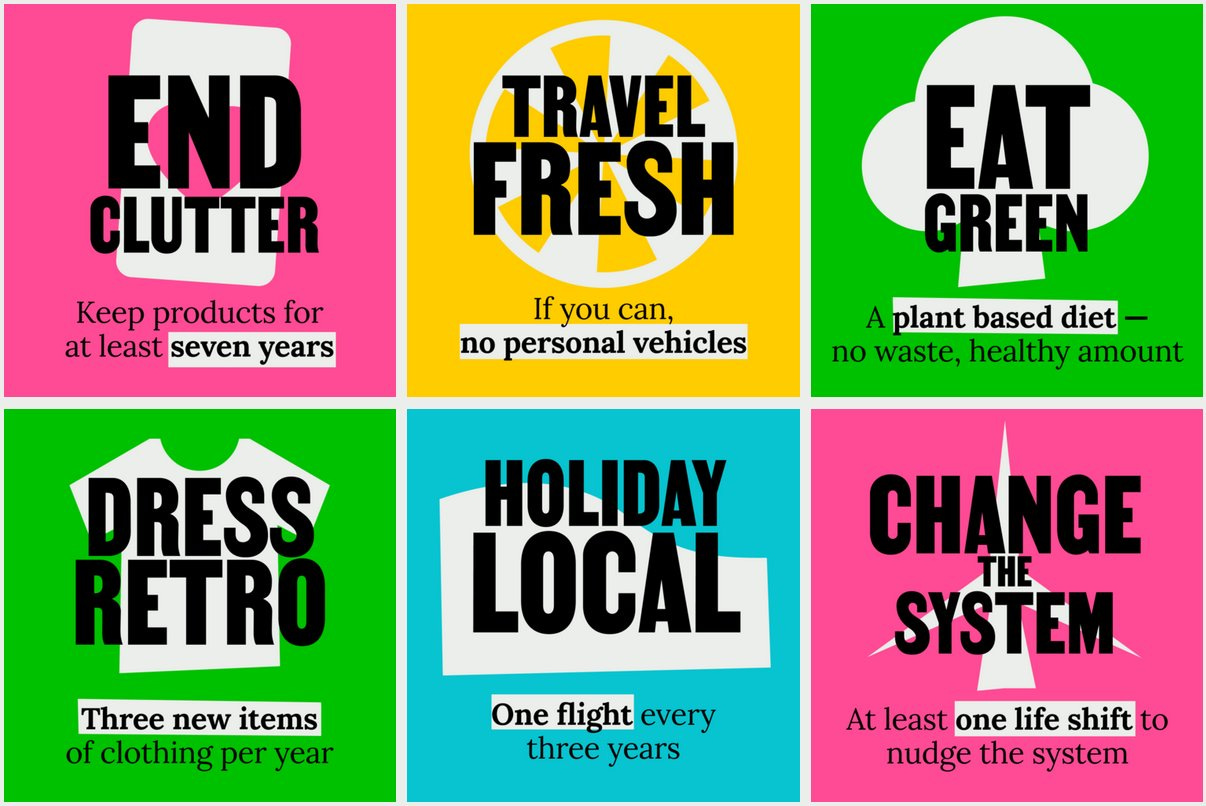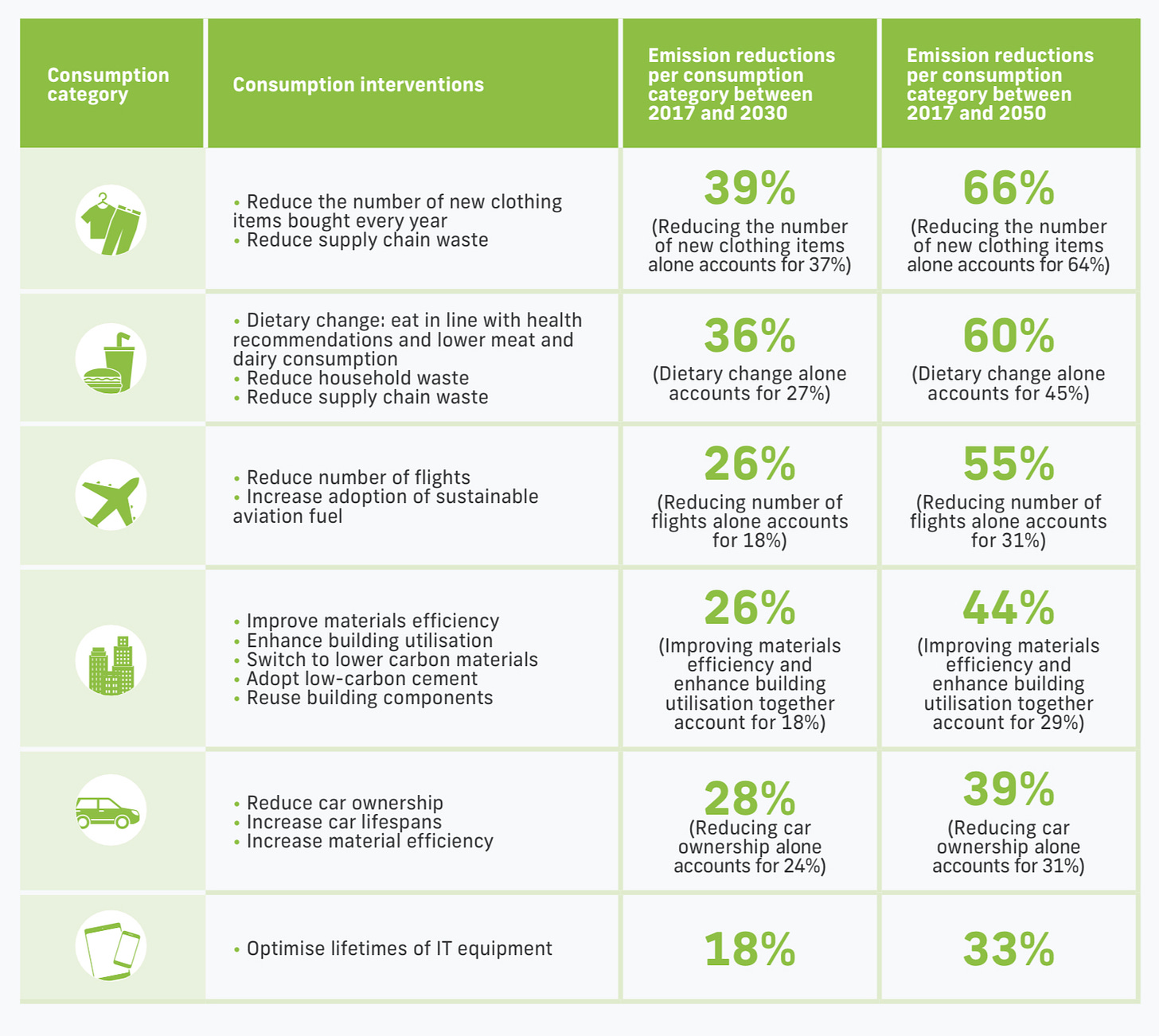18 March 2022. Climate | Technology
Making a difference to climate change. New technologies always bring baggage with them.
Welcome to Just Two Things, which I try to publish daily, five days a week. Some links may also appear on my blog from time to time. Links to the main articles are in cross-heads as well as the story. Recent editions are archived and searchable on Wordpress.
1: Making a difference to climate change
I’m curious about The Jump, which Ian Christie alerted me to a few weeks ago. It’s a project that seems to have distilled personal climate change action down to six things that will make the most difference, and wrapped them up in some in your face design. Here are the six things, in one handy image.
(Source: The Jump)
On the face of it, this looks like the kind of ‘nudge’ campaign we’ve seen before in the area of climate change—except when you read the (large) print, it’s clearly a bit more radical... only three new items of clothing a year, one flight every three years, don’t use a car (I’m assuming that no ‘personal vehicles’ doesn’t extend to bikes or scooters).
They have a video that also tells the story they’re trying to communicate:
There’s also some theory that sits behind this. Jeremy Williams, who had a piece on his Earthbound blog that reminded me to come back to The Jump, notes that it’s based on some reasonably heavyweight academic research by a group involving C40 Cities, Arup, and Leeds University, and here’s a findings summary table of emissions reduction impacts of various tyoes of consumer change from that report.
I liked the messaging on The Jump’s site, which triangulated its way through three of the issues that get raised when people try to do something for climate change. Yes, it will make a difference. No, it’s not all about hair shirts. Yes, you will get support:
1. You’ll make an impact: Government and business do have most responsibility, but science shows that in wealthy countries everyone needs to make these 6 Shifts within 10 years.
2. You’ll enjoy it: Less consuming but more creativity, care, comedy, camaraderie, contentment, craft, connection, celebration, culture and community.
3. You’ll get support: This grassroots movement offers the community and the tools to help along the way.
It’s also clear that there’s some change theory sitting inside the thinking, also communicated, well, brightly.
(Source: The Jump)
On the site each of these clicks through to a story. I liked the one about ‘Jump for Joy’, because I think the only way that we’ll break out of our present vicious cycle of consumption, carbon emissions and global heating is by discovering that a bit less capitalism actually makes us feel better. (No, ‘decoupling’ won’t cut it.)
THIS IS NOT ABOUT SACRIFICE. IT’S ABOUT LIVING OUR LIVES MORE FULLY.
Let’s have some fun! Let’s do something joyous! Let’s take time to connect with what actually makes life good. Being with the people we care about, being in nature, laughing, making, being kind to ourselves and each other...
NOT BACK TO THE STONE AGE….. JUST FINDING A BALANCE.
Taking the JUMP does not mean we must stop consuming all together and go back to living in caves. With the shifts, we can still eat lovely food, see plenty of the world in our lifetimes and dress magnificently. Yet we can do so with more time for ourselves and loved ones, more peace of mind.
And yes, they are focussing on those of us, at least at a planetary level, who are better off and are responsible for most of the emissions. Will it have much impact beyond people who are already climate-engaged? I’m not sure, but at least it stretches the ‘Overton Window’ on the kinds of individual and household actions that are credible in terms of making a difference to climate change.
The Jump is funded by the National Lottery and the Tudor Trust, and has had support in kind from Arup and a creative agency, Glimpse.
2: New technologies always come with baggage
Saturday Night Live reminds us that every technology drags a social context and a history along with it, no matter how novel or radical it seems. Thanks to Peter Curry for the link.
Notes from readers:
I had a look at the V-Dem report on the current state of democracy on Tuesday. Karl Wilding was interested enough to dive into the report and have a look at the data in it about civil society organisations (he used to work at the UK’s National Centre for Voluntary Organisations).
He produced a useful Twitter thread which starts here:


Or you can read the Thread Reader version here if you don’t want to be side tracked by Twitter.
TLDR: democracy is backsliding in many countries and not in great health.
And in countries where democracy is getting worse, the key indicators include how civil society is treated (whether you can set up an organisation, whether civil society is consulted by government; whether people at large are getting involved in civil society).
Ukraine notes:
Restofworld had a piece—headlined ‘I bought a one-way ticket’—about young, skilled Russians in the tech sector leaving because of the war, for economic or political reasons, or both.
The IT industry comprises less than 1% of Russia’s GDP, according to 2021 research from the Higher School of Economics University. However, entrepreneurs are often drivers of the economy, and the economy will, eventually, feel their absence. “I don’t think it will be an immediate effect, but it’s more of a brain drain effect,” (Silicon Valley based Russian tech entrepreneur Roman) Shaposhnik said. “A lot of people are trying to figure out how they can get their professional life on track just outside of Russia.”
Once that sort of exodus starts to happen, it can take a long time to reverse it.
In a similar vein, there was a piece in Quillette written by an anonymous Englishman now living in a city in Southern Russia about waving goodbye to his daughter and ex-partner as they left Russia, possibly for good, as the war broke out. ‘Robert Gintzburg’ had moved to the city to help bring up his daughter. It is a beautifully written piece, almost too well written, wistful to the point of sadness. The experience of saying goodbye to someone leaving on a train seems to be universal:
The parting was an almost comically clichéd wartime scene—the escape on the night-train, tears, hugs, the heaving suitcases, the conversations through the glass and, finally, the faces disappearing into the distance. The grandmother and I walked back together to our empty flats, silent and sad, neither of us knowing when we would see these two people again.
And: As peace talks continue, it’s worth looking at the assessment made right at the start of the war by the Pugwash Conference people about the type of agreement that could be constructed to end the war. (It’s section 5 of their Statement).
j2t#282
If you are enjoying Just Two Things, please do send it on to a friend or colleague.





